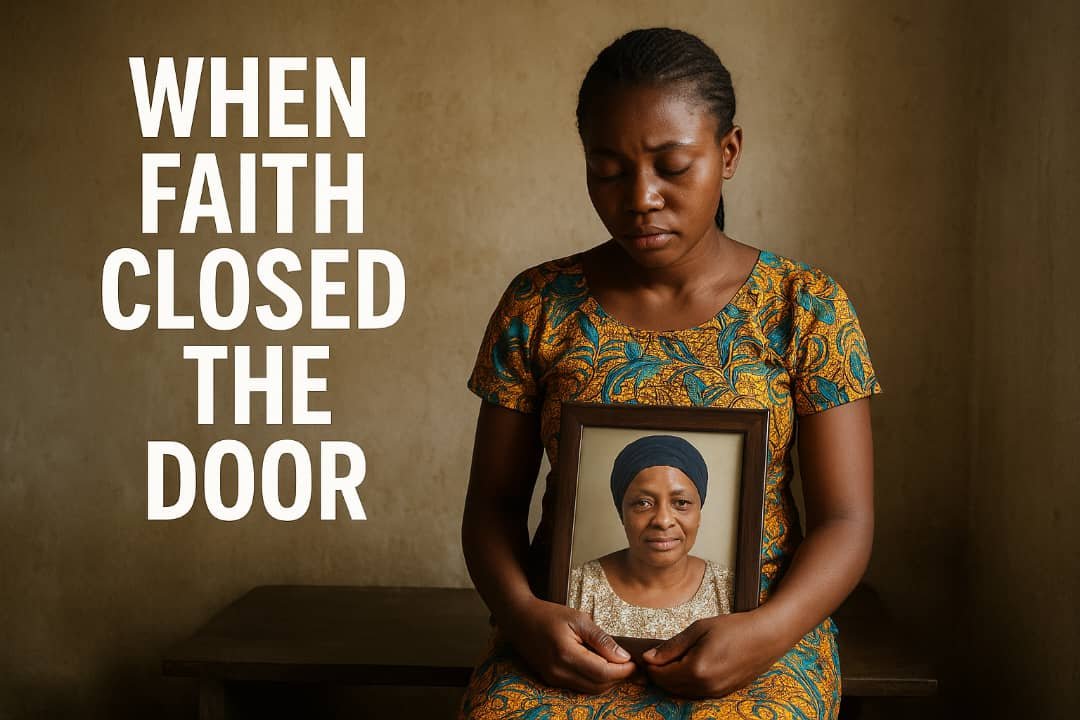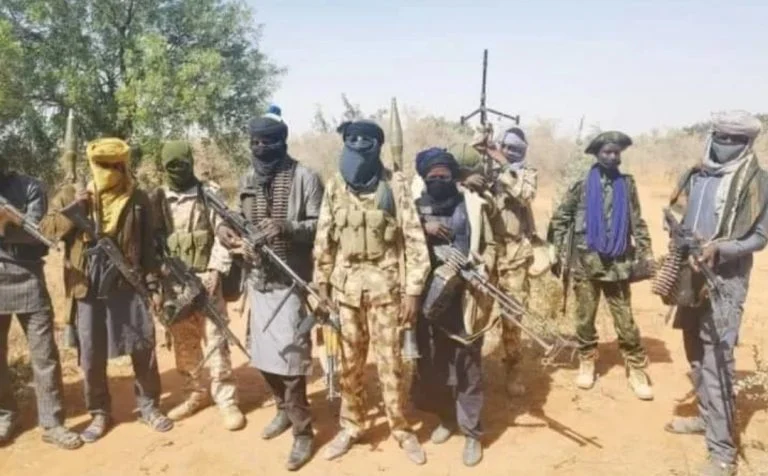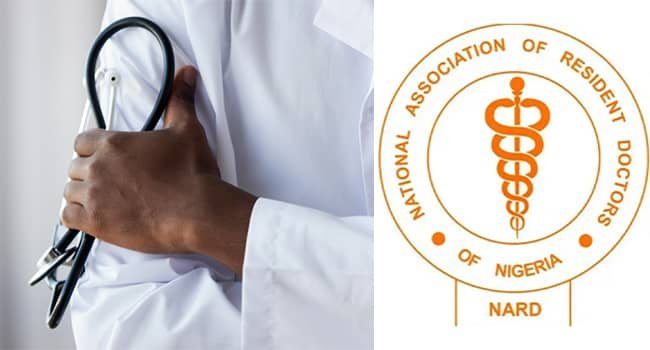
On a humid evening in Ette, Enugu State, as the last traces of sunset washed the village in a soft red glow, 26-year-old Gift knelt beside her mother’s bed and begged her to live. But the answer never changed. Her mother, frail yet unwavering, whispered, “If I die, I will die in good faith.”
That sentence—gentle, resolute, final—has since become the heaviest weight on Gift’s heart.
In this report, Juliet Jacob examines how a family’s devotion collided with medical reality, creating a tragedy that continues to echo across communities where faith, fear, and health collide. It is a story of suffering, conviction, and a daughter still grasping for meaning in the silence her mother left behind.
WHEN FAITH AND MEDICINE COLLIDE
Across Nigeria, religion is not merely practised—it shapes decisions, commands loyalty, and frequently determines how families confront medical crises. In many homes, life-saving procedures such as blood transfusion are not just clinical interventions—they are spiritual tests.
For some, faith is an anchor. For others, it becomes a barrier.
Gift knows this better than most.
Her mother, a committed Jehovah’s Witness, first noticed a small swelling beneath her neck— “nothing alarming,” Gift recalled. “We thought it would just go away.” But the swelling worsened, followed by weakness, dizziness, and frequent infections.
At Parklink Hospital in Enugu, doctors delivered a diagnosis that felt like a thunderclap: leukaemia. The family staggered under the news, but treatment began and hope flickered.
“She responded well for some weeks,” Gift said, describing the reprieve. “We thought things were turning around.”
But then everything changed.
THE MOMENT HOPE MET A WALL
When doctors referred her mother to the Lagos State University Teaching Hospital (LASUTH), a more advanced facility, they also made a critical medical call: she urgently needed a blood transfusion.
According to Gift, the refusal was immediate.
“She said, ‘No. I cannot take blood,’” Gift recounted, her voice tightening. “She said she would rather die in good faith than disobey what she believed was God’s instruction.”
The family pleaded, prayed, bargained. They brought zobo. Herbal mixtures. Nutritional boosters. They tried anything that might raise her blood levels.
Nothing worked.
Doctors explained the unavoidable truth: without transfusion, chemotherapy could not continue. The disease would advance unchecked.
With no alternative, she was discharged.
“We took her home because we had no choice,” Gift said. “But we were breaking inside.”
Days later, weakened and frightened, her mother suddenly said she was ready to accept blood. Relieved, they rushed to Enugu.
But in the hospital hallway, fear overcame her again.
“She looked at us and just said, ‘No. I can’t.’ And that was it,” Gift whispered.
That same evening, her mother passed away.
A DAUGHTER’S LINGERING QUESTION: “WHAT IF?”
Gift often replays the sequence in her mind.
“Leukaemia can be managed,” she said quietly. “People survive it. She could have lived longer. Maybe not forever, but longer. We would have tried. That is what hurts.”
The pain, she said, is not rooted in anger. It is rooted in helplessness—and the fear that other families may repeat the same path.
THE MEDICAL REALITY BEHIND LEUKAEMIA
Leukaemia is a cancer of the blood-forming tissues, characterised by the uncontrolled growth of abnormal white blood cells that crowd out healthy cells.
According to the World Health Organisation, more than 474,000 new cases are recorded globally each year.
In high-income countries, survival rates are significantly higher due to timely diagnosis, chemotherapy, and—critically—blood transfusion support.
In contrast, in many African regions, mortality approaches 80 percent, worsened by limited resources, late presentation, and—in some cases—religious refusal of transfusion.
Former president of the American Society of Haematology, Dr Jeffrey Carson, notes that patients who decline transfusion have dramatically higher mortality rates, particularly during chemotherapy when blood levels fall sharply.
A 2024 review in Annals of Blood reached the same conclusion: without transfusion support, remission rates plummet.
Even “bloodless” medical centres acknowledge these limitations. Alternatives may reduce transfusion needs, but none can fully replace blood in acute leukaemia cases.
FAITH COMMUNITIES SPEAK
To understand the doctrinal divide, Africa Health Report sought the insights of religious leaders in Abuja.
“It Is a Biblical Command” — Jehovah’s Witness Spokesperson
Spokesperson for Jehovah’s Witnesses in Nigeria, Mr Kindness Tochukwu, explained that the refusal of blood transfusion stems from biblical interpretation, not a rejection of medicine.
“We believe the Bible instructs us to abstain from blood,” he said. “But we are not against medical care. We encourage non-blood medical alternatives, which have been proven effective globally.”
He dismissed claims that Witnesses practise faith healing or endanger their children, insisting that modern bloodless techniques are safe and increasingly mainstream.
“Faith Must Walk with Wisdom” — Pentecostal Pastor
Pastor Obed Jesse of Christ Victorious in Power Church in Kubwa held the opposite view.
“Scripture does not forbid medical treatment or blood transfusion,” he said firmly. “Rejecting life-saving care can amount to negligence. God uses doctors. He gives humans knowledge. Christianity has a long history of medical missions.”
He argued that balanced teaching, not fear, should guide believers.
WHY BLOOD IS NON-NEGOTIABLE FOR LEUKAEMIA PATIENTS
Consultant Haematologist at the Benue State University Teaching Hospital, Makurdi, Dr Ifechukwude Osunde explained that leukaemia patients suffer from severe anaemia, recurrent infections, and prolonged bleeding due to faulty blood production.
“Chemotherapy suppresses the bone marrow further,” she noted. “Without transfusion, treatment becomes unsafe or impossible.”
She emphasised that while patients have the right to refuse care, the consequences are often irreversible.
“For minors, the law sometimes intervenes. But with adults, all we can do is counsel compassionately,” she added.
Her voice softened. “The hardest moments are when we lose a patient who could have been saved.”
FAITH, FAMILY, AND THE BURDEN OF CHOICE
Dr Osunde stressed that family influence often determines outcomes. When relatives support medical intervention, patients tend to accept it. But when an entire household shares doctrinal objections, refusal becomes firmer, leaving clinicians powerless.
“It is heartbreaking when belief triumphs over survival,” she said.
A WARNING WRITTEN IN GRIEF
In the quiet corners of Ette, where her mother once prayed, Gift now carries a message she hopes will save others.
“God gave us doctors,” she said. “Taking blood to stay alive is not a sin. Faith should give us life—not take it away.”
Her voice wavered, but her resolve did not.
“I’m telling this story so another daughter will not cry like I cried.”
Efforts by the Africa Health Report to obtain the reaction of LASUTH Chief Medical Director, Professor Adetokunbo Fabamwo, were unsuccessful.
“When Faith Closed the Door”: A Daughter’s Plea After Her Mother Chose Belief Over Blood




